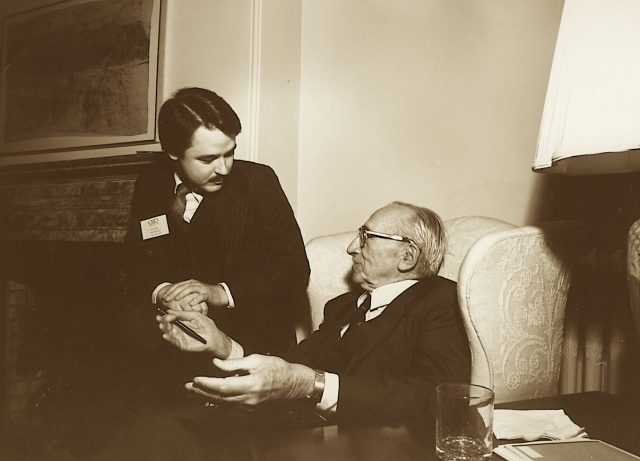
On 7 June 2024, the prominent American libertarian thinker and activist David Boaz, Executive Vice President of the Washington DC free-market think tank Cato Institute, passed away, at the untimely age of 69. We were never personally close, but our relations were friendly and respectful. We occasionally ran into each other at meetings of the Mont Pelerin Society—an international association of classical liberal and conservative scholars, activists and men of affairs—or during my rather infrequent visits to Washington DC. A mutual friend, Dr. Tom G. Palmer of the Atlas Network, eloquently paid tribute to him: ‘Through him, so many people were introduced to the humane, decent, rational, and compassionate case for “the simple system of natural liberty”. So many successful and happy careers were launched.’
An Inspiration to Young and Old
David (depicted above in 1982 with Friedrich A. von Hayek) was no conservative in the most common sense of the word, and he was reluctant to call himself a liberal because in the United States that label has been appropriated by social democrats and even outright socialists. He therefore defined himself as being a libertarian. He was once asked by some skeptics what the most important libertarian accomplishment ever was. He said, ‘the abolition of slavery’. Okay, they conceded. Name another. David thought more carefully and said, ‘bringing power under the rule of law’. He later added: ‘That was a revolutionary achievement, but it’s incomplete. It’s what we still fight for.’ He also once remarked that the ‘difference between libertarianism and socialism is that libertarians will tolerate the existence of a socialist community, but socialists can’t tolerate a libertarian community’.
At the Cato Institute, David made a lasting contribution to liberty: it is one of the most active and effective free-market think tanks in the world, with its unwavering support of sound scholarship and its refusal to make compromises with special interests or with the powers to be. At Cato, he acted as an adviser, editor, speaker, teacher, and most of all as an inspiration to young and old. His other main contribution to liberty was the many books he wrote or edited. Dr. Diogo Costa, Director of the Foundation for Economic Education, plausibly observes that his ‘brand of libertarianism was persuasive and historical. Rather than advocating a narrow, sectarian view, he situated libertarianism within the greater context of liberalism, presenting it as a manifestation of long-standing principles.’
The Roots of Libertarianism
Here I shall only briefly mention one of David’s books. In 1997, he published Libertarianism: A Primer, later updated and revised as The Libertarian Mind: A Manifesto for Freedom. Intriguingly, he suggested that the first libertarian might have been the Chinese philosopher Lao-tzu, who lived in the sixth century BC and who wrote: ‘Without law or compulsion, men would dwell in harmony.’ David quoted (a shortened version of) the dire premonition about government in the First Book of Samuel: ‘This will be the manner of the king that shall reign over you: He will take your sons, for his chariots. And he will take your daughters, to be cooks. And he will take your fields, and your oliveyards, even the best of them, and give them to his servants. And he will take the tenth of your seed, and of your vineyards, and of your sheep: and ye shall be his servants.’ David pointed out, again, that Jesus made a crucial distinction between two realms with his famous answer to a question about taxes: ‘Render unto Caesar the things that are Caesar’s and unto God the things that are God’s.’ This is a powerful, nay, seminal, idea: Not all of life should be under government control.
In his illuminating discussion in the book about the historical roots of libertarianism, David agreed with the eminent historian Ralph Raico (from whom I also learned a lot in the 1980s at seminars of the Institute for Humane Studies) that ‘the Renaissance can be overrated as a progenitor of liberalism; the medieval charters of rights and independent legal institutions provided a more secure footing for freedom than the Promethean individualism of the Renaissance’. This is indeed a research programme that I myself have been exploring recently regarding the Nordic countries, with their strong legal tradition, defended by thinkers such as Snorri Sturluson, Anders Chydenius, and Nikolaj F. S. Grundtvig and expressed in the Danish Law of Jutland (1241), the Swedish Rules for Judges (1525) and several Scandinavian royal charters between 1282 and 1648. But following a well-established tradition, David presented John Locke and Adam Smith as the fathers of classical liberalism in the modern sense, or libertarianism. On that, I would only add an observation by Lord Acton in an 1880 letter to Mary Gladstone: ‘Ideas have a radiation and development, an ancestry and posterity of their own, in which men play the part of godfathers and godmothers more than that of legitimate parents.’



 Subscribe
Subscribe